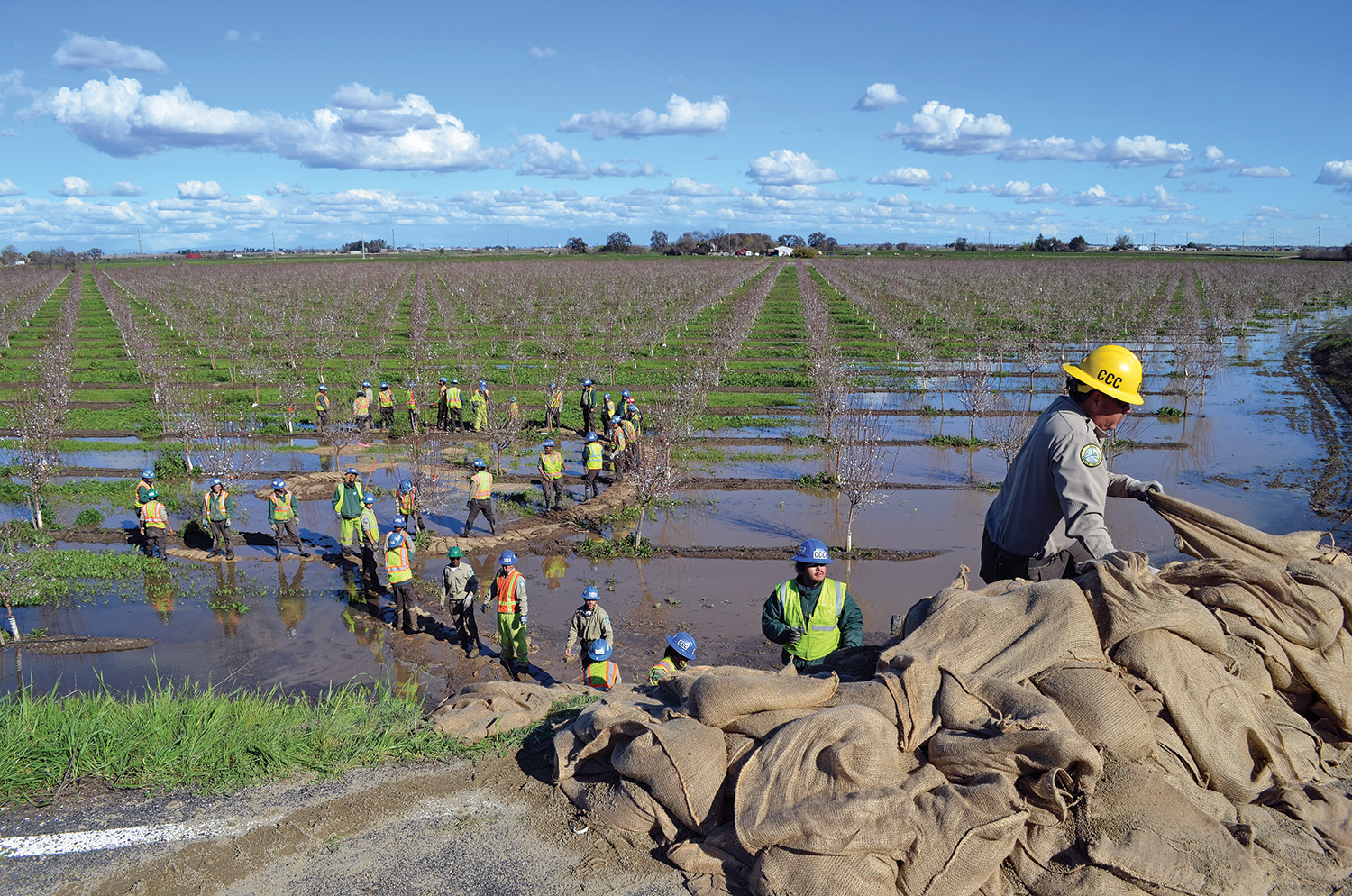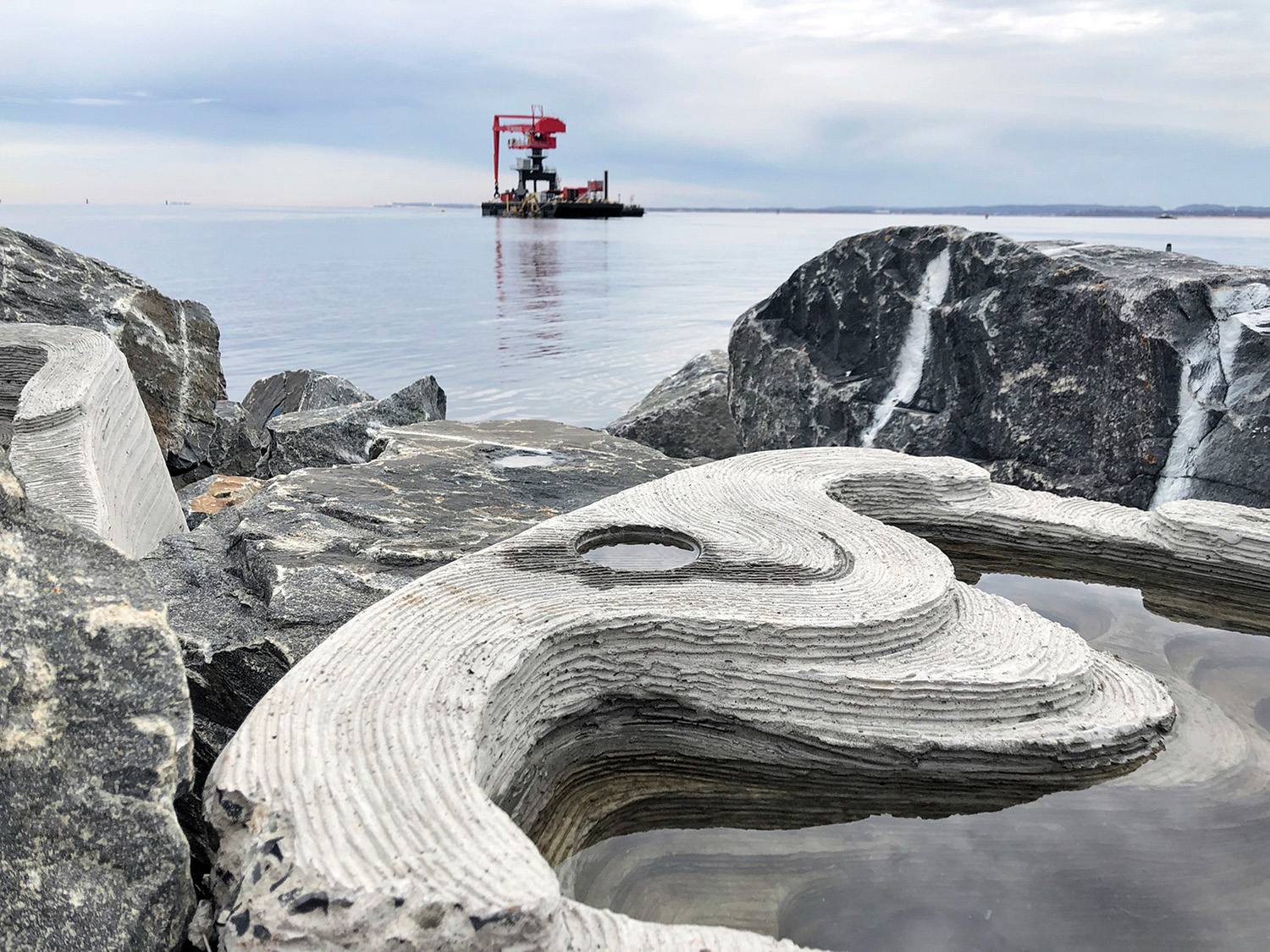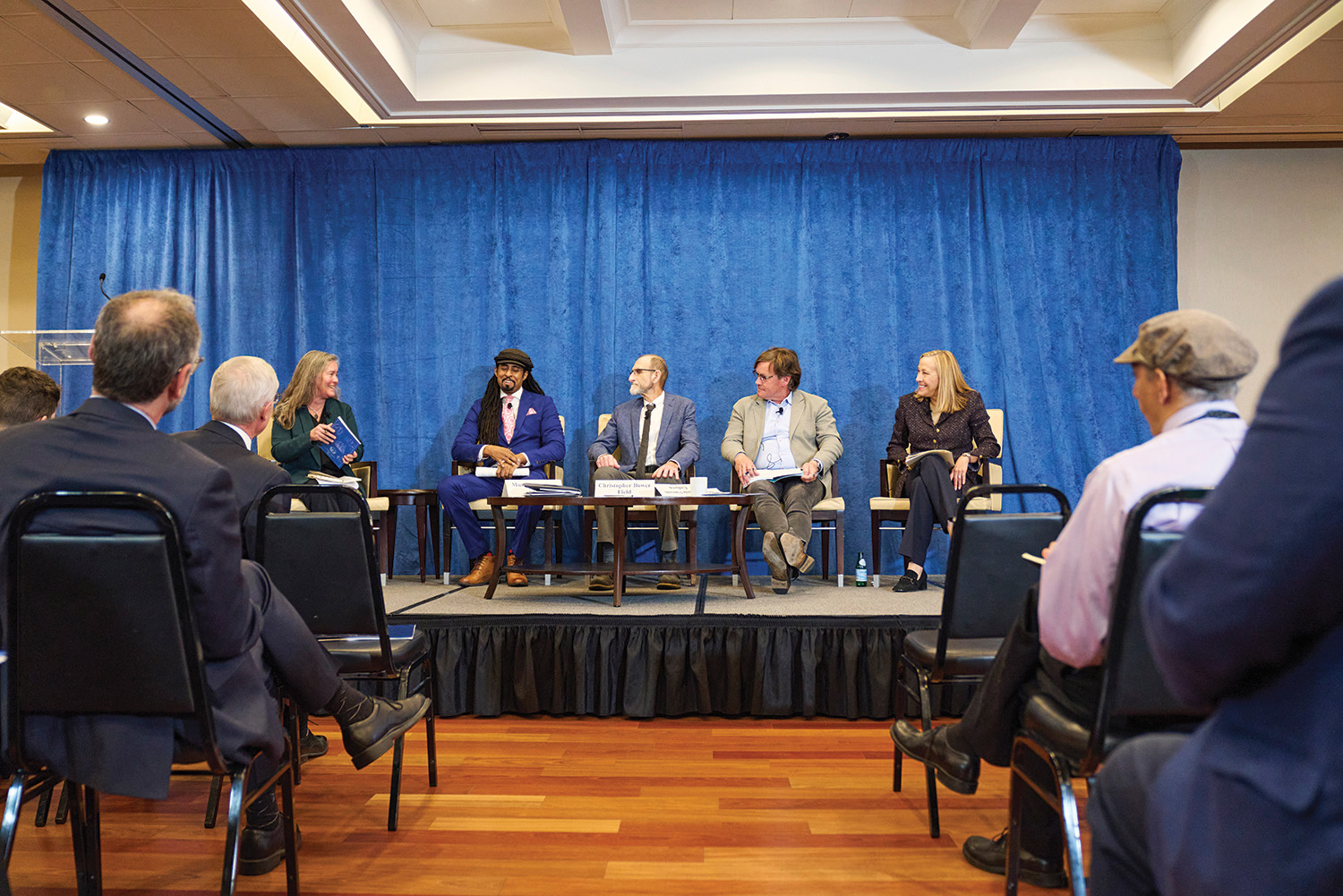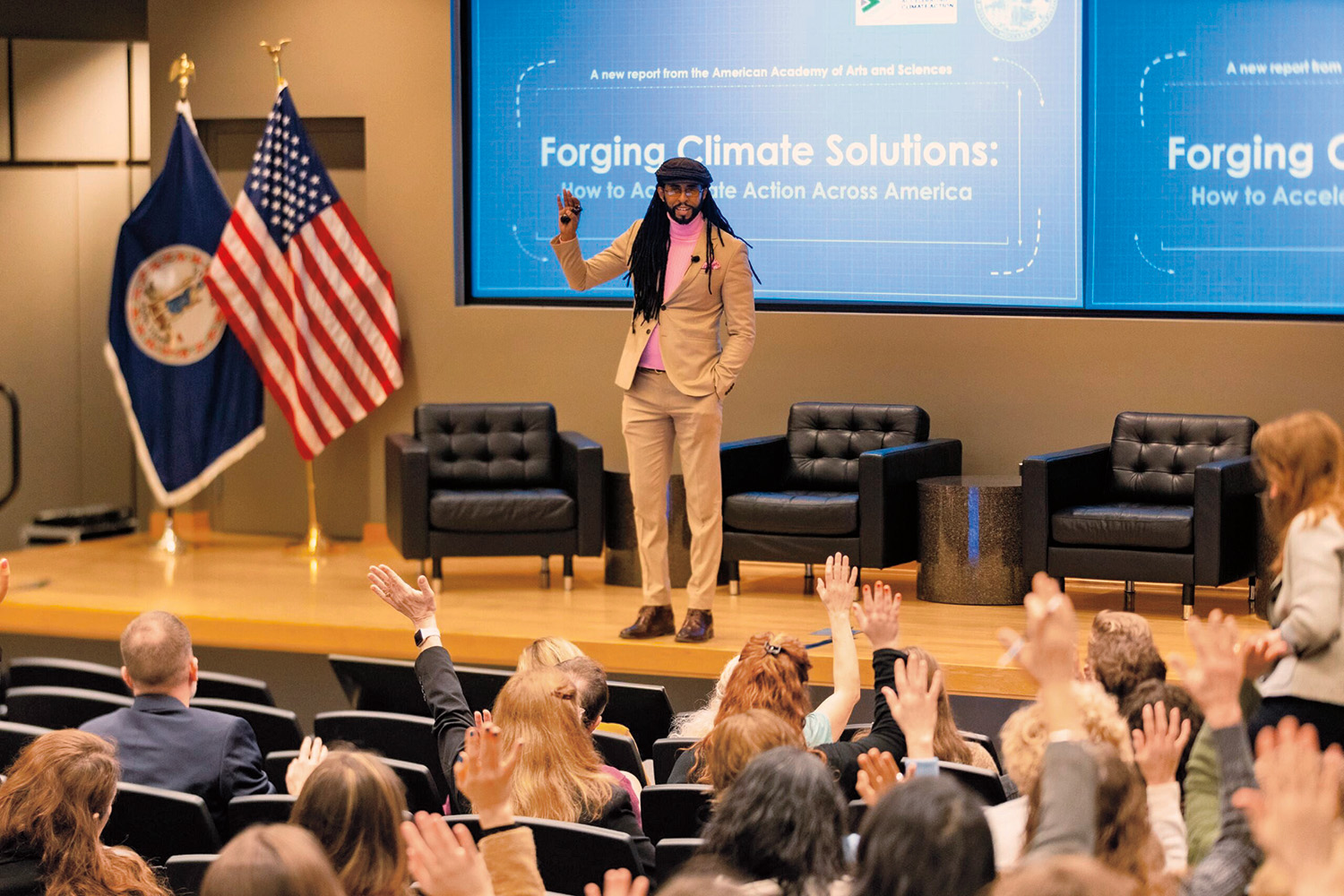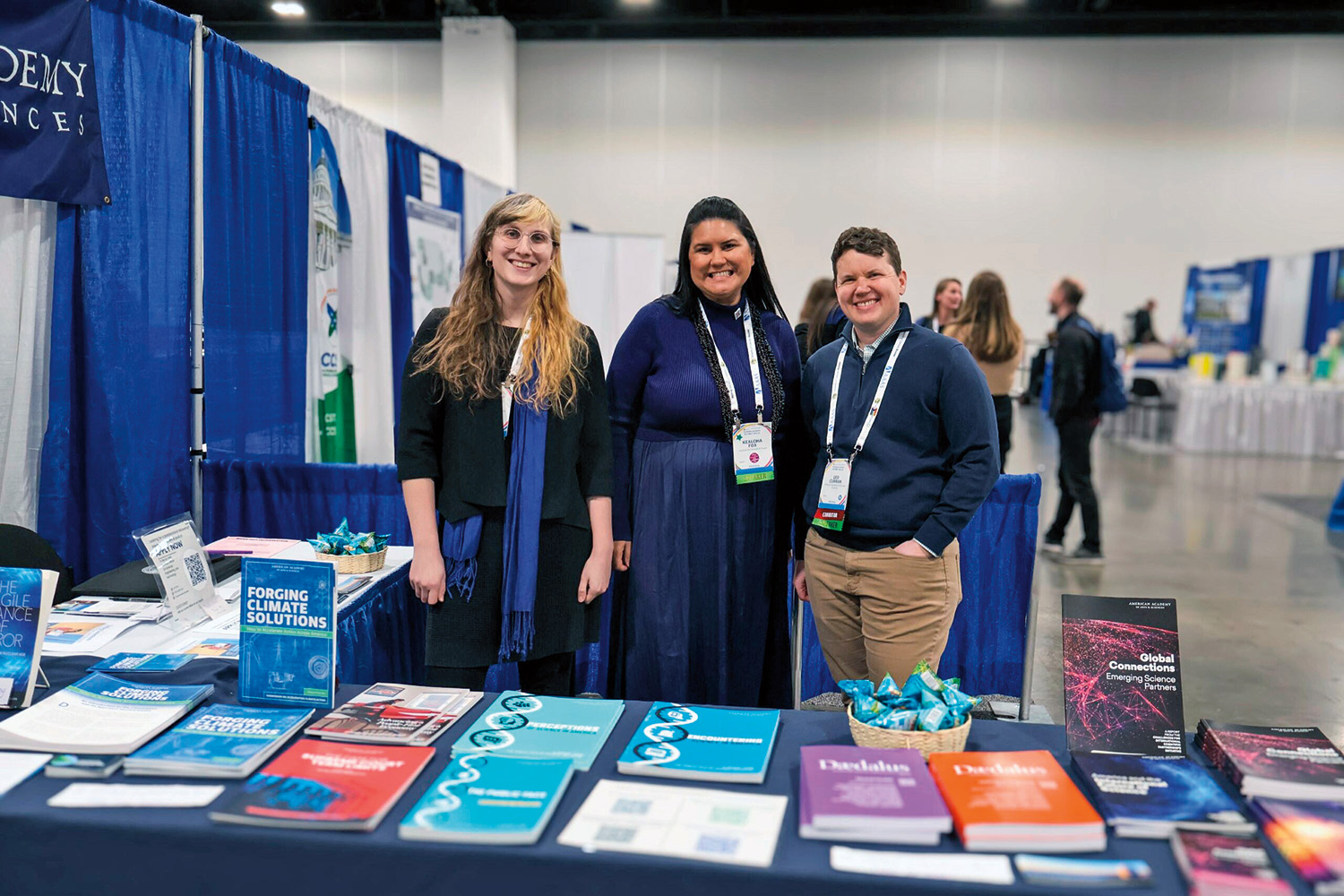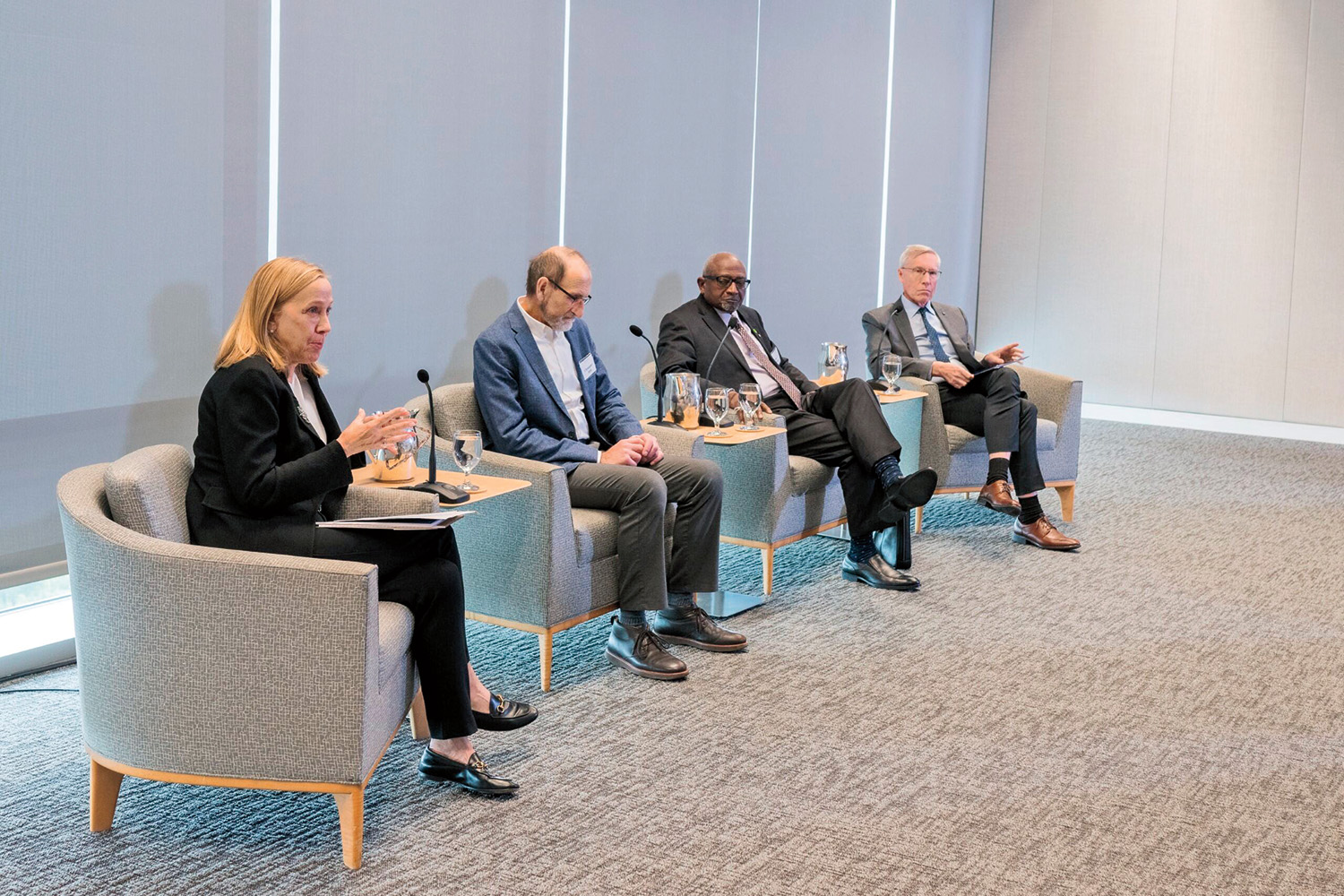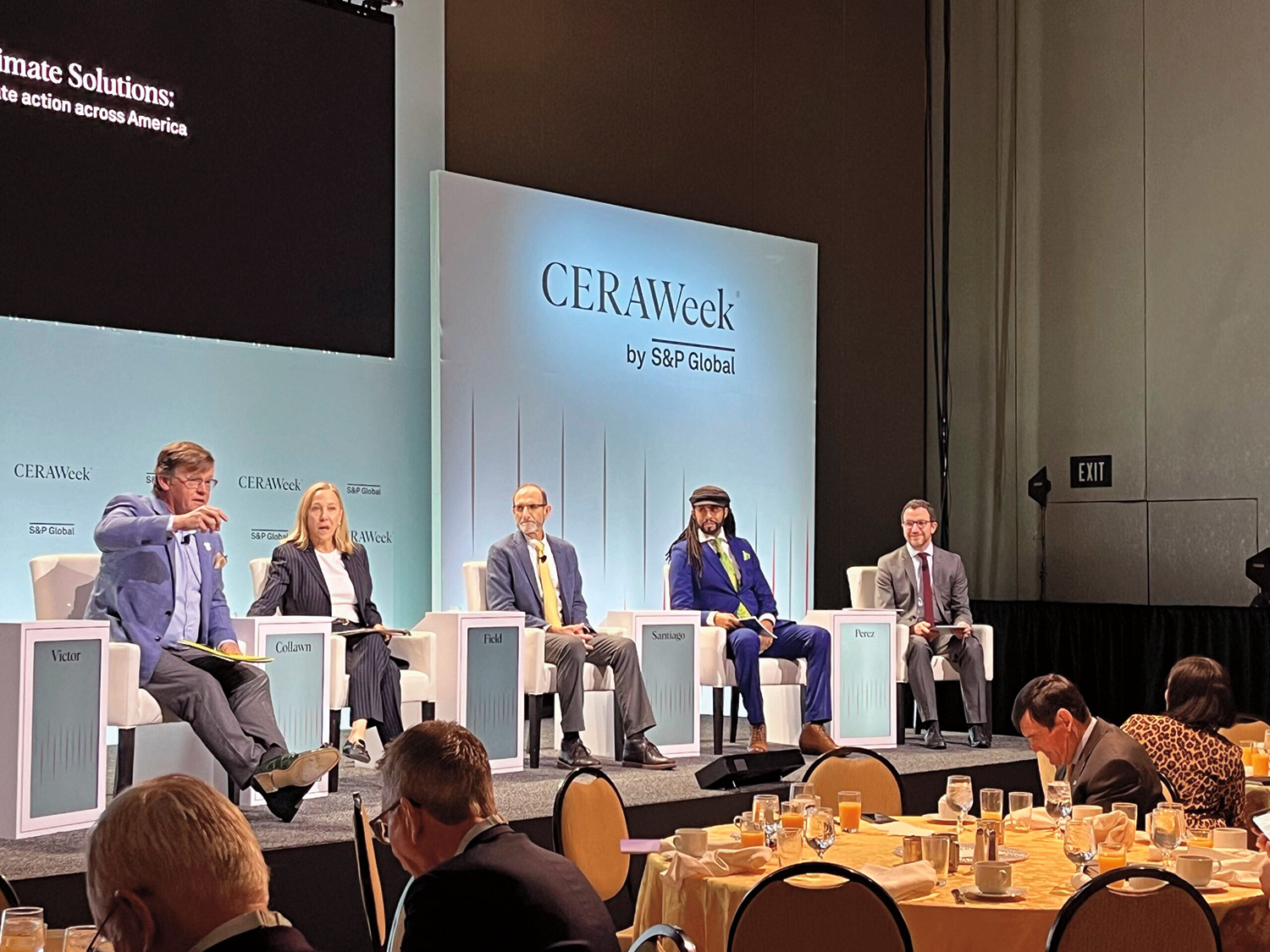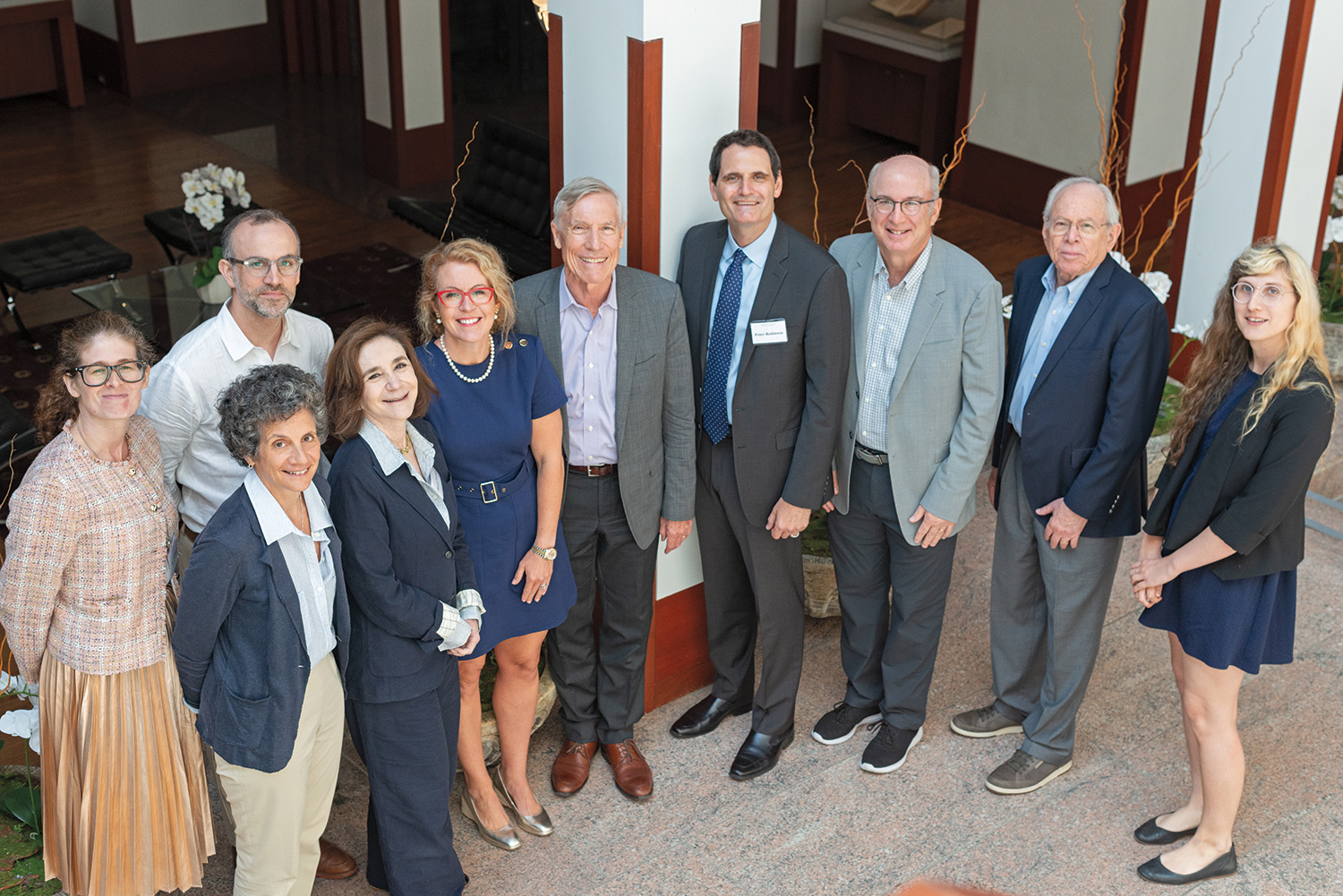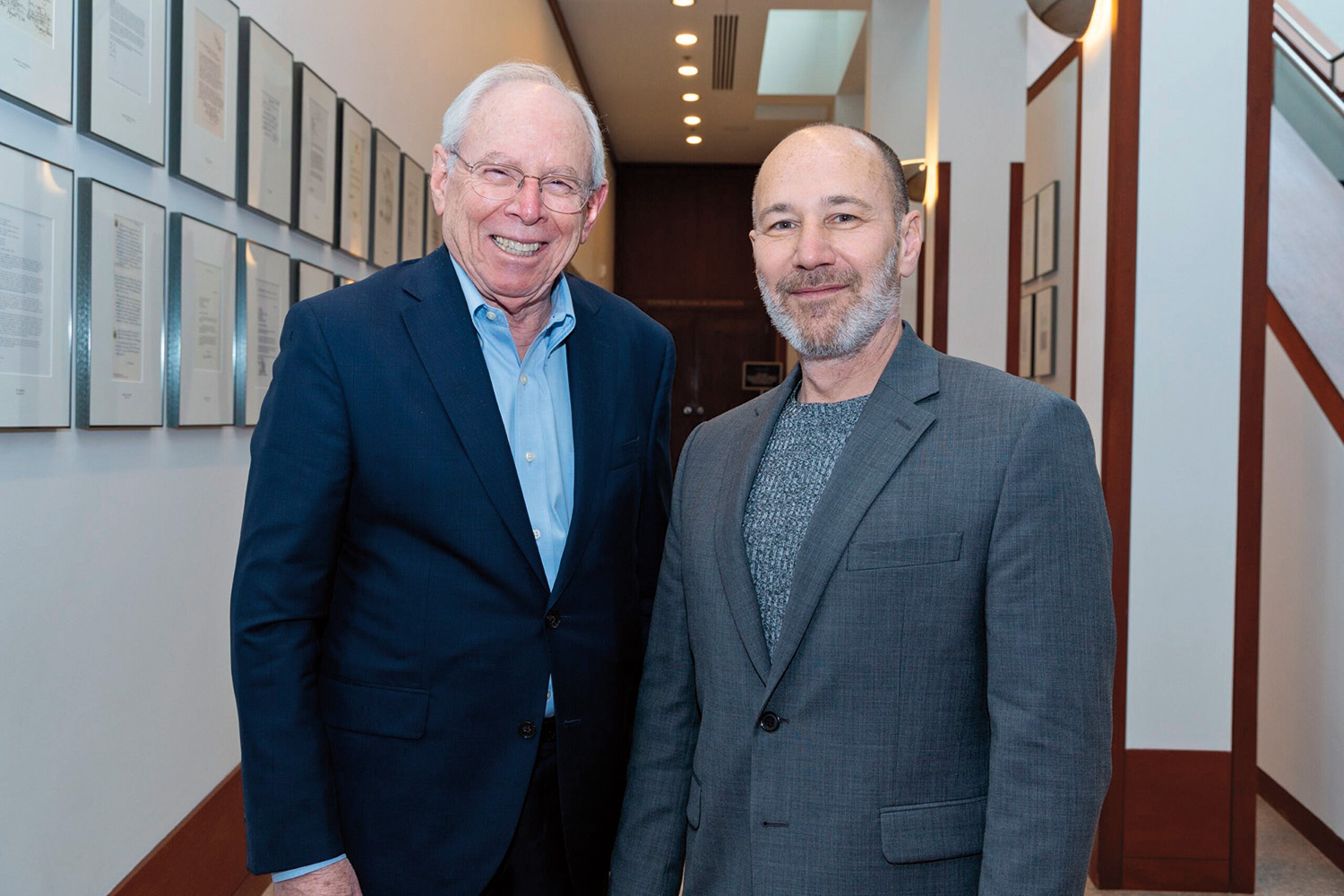The Academy’s record of distinction in Science, Engineering, and Technology dates to its founding mission “to cultivate every art and science which may tend to advance the interest, honor, dignity, and happiness of a free, independent, and virtuous people.” Rather than generate new scientific research, the role of the Academy has been uniquely interdisciplinary, bridging the social sciences and arts with the physical sciences to support a national understanding, belief, and trust in science and discovery. Perhaps no better example of this can be found than in the mid-1800s when the Academy hosted hotly contested debates about a new scientific theory–the theory of evolution.
Academy projects in Science, Engineering, and Technology seek to strengthen the capacity of science and engineering to improve the human condition. This goal has never been more important for the nation or for the world than it is today. Global challenges increasingly require collaboration across disciplinary, professional, and national boundaries. Likewise, rapid advances in information processing and transmission raise new issues for the management of scientific knowledge and for action on new discoveries.
Advisory Committee
Robert F. Higgins, Cochair
Causeway Media Partners
Shirley Tilghman, Cochair
Princeton University
Maya Ajmera
Science News
Ken Alder
Northwestern University
Nancy C. Andrews
Boston Children’s Hospital
Juan Enriquez
Excel Venture Management
Efi Foufoula-Georgiou
University of California, Irvine
Fred H. Gage
Salk Institute for Biological Studies
Paula A. Johnson
Wellesley College
James M. Manyika
Google
David W. Oxtoby
American Academy of Arts and Sciences
Joe Palca
formerly, National Public Radio
Mercedes Pascual
University of Chicago
Peter L. Slavin
Massachusetts General Hospital
Advisory Committee Meetings
August 23, 2023;
December 6, 2023;
March 28, 2024;
August 14, 2024;
November 13, 2024
Project
Commission on Accelerating Climate Action
The scientific consensus is clear: climate change is upon us, and its impacts will be devastating and increasingly difficult to prevent and address if we do not take action now. While most Americans express support for a broad array of climate policies and government action, a continued partisan divide has impeded the United States’ efforts to craft a long-term plan for climate action. Recent legislative successes have begun to create momentum for change, yet the country still lacks a broad and politically durable coalition to ensure that progress does not stall. To address this challenge facing our global society, the Academy launched a project on climate action in September 2021.
Unlike other climate change studies, the Commission on Accelerating Climate Action did not produce or analyze climate science data, nor limit its recommendations to certain disciplines or economic sectors. Rather, the Commission leveraged the full toolkit of its broad membership to reveal unique and creative interdisciplinary solutions: novel, specific, targeted actions that, if taken, would dramatically alter the trajectory of U.S. action on climate change.
In fall 2023, the Commission published its recommendations in a consensus final report, Forging Climate Solutions: How to Accelerate Action Across America. The report offers five strategies and twenty-one recommendations for forging a climate blueprint and articulates how a whole-of-society commitment can emerge. These include prioritizing equity, fairness, and justice in climate action; engaging and educating; mobilizing investments; deploying strategic mitigation; and ensuring adaptation everywhere. Together, the strategies and recommendations detail how the private sector, frontline communities, government, and environmental groups convene to build infrastructure, reduce emissions, and prepare for the impacts of climate change, with justice as a guiding philosophy. The Commission’s report outreach has prioritized reaching new audiences through briefings and presentations to share the whole-of-society approach.
COMMISSION CHAIRS
Mustafa Santiago Ali
National Wildlife Federation; Revitalization Strategies
Christopher Field
Stanford University
David G. Victor
University of California, San Diego
Patricia Vincent-Collawn
PNM Resources
COMMISSION MEMBERS
Benjamin Backer
American Conservation Coalition
Phyllis L. Bayer
Dumbarton Strategies, LLC
Mitchell Bernard
Natural Resources Defense Council, Inc.
Philip Bredesen
State of Tennessee; Silicon Ranch
Patricia Cochran
Alaska Native Science Commission
Ertharin Cousin
Food Systems for the Future
Mariano-Florentino Cuéllar
Carnegie Endowment for International Peace
L. Kealoha Fox
Institute for Climate & Peace
Tim Guinee
Climate Actors
Rebecca Henderson
Harvard University
Mitchell C. Hescox
Evangelical Environmental Network
Charles O. Holliday, Jr.
Mission Possible Partnership
Russel L. Honoré
Joint Task Force Katrina, Leadership, Safety & Global Preparedness Authority
Bob Inglis
republicEn.org
Kathleen Hall Jamieson
University of Pennsylvania
Alexander Karsner
X (Alphabet Inc.)
Elizabeth Kolbert
The New Yorker
John Paul Mejia
Sunrise Movement
Katherine Orff
SCAPE
David W. Oxtoby
American Academy of Arts and Sciences
Gary Roughead
Hoover Institution
Linda Rudolph
Public Health Institute; Medical Society Consortium on Climate and Health
Roger Sant
The Summit Foundation
J. Marshall Shepherd
University of Georgia
Doreen Stabinsky
College of the Atlantic
Hilary Tompkins
Hogan Lovells
Elke Weber
Princeton University
PROJECT STAFF
Carson Bullock
Hellman and Simons Fellow in Science and Technology Policy
Kate Carter
Senior Program Officer for Science, Engineering, and Technology
Peter Robinson
Chief Program Officer
Jennifer Smith
Program Associate for Science, Engineering, and Technology
FORMER PROJECT STAFF
Sophia Charan
Hellman Fellow for Science and Technology Policy
Leo Curran
John E. Bryson Program Director for Science, Engineering, and Technology
Islam Qasem
John E. Bryson Program Director for Science, Engineering, and Technology
Kelsey Schuch
Hellman Fellow for Science and Technology Policy
Rebecca Tiernan
Program Associate for Science, Engineering, and Technology
Amanda Vernon
Program Officer for Science, Engineering, and Technology
FUNDERS
John E. Bryson and Louise Henry Bryson
Hansjörg Wyss
Bob Higgins
The Alfred P. Sloan Foundation
The Grantham Foundation for the Protection of the Environment
The David and Ellen Lee Family Foundation
William and Helen Pounds
Roger Sant and Doris Matsui
Commission Publications
Forging Climate Solutions: How to Accelerate Action Across America (American Academy of Arts and Sciences, 2023)
Proven Principles of Effective Climate Change Communication (American Academy of Arts and Sciences, 2023)
Climate Change Security Risks and Opportunities (American Academy of Arts and Sciences, 2023)
Barriers to Private Sector Action (American Academy of Arts and Sciences, 2023)
Commission Meetings
Report Launch: Forging Climate Solutions: How to Accelerate Action Across America
October 24, 2023
Washington, D.C.
To celebrate the release of Forging Climate Solutions: How to Accelerate Action Across America, Laura Helmuth (Scientific American) moderated a panel discussion with the Commission’s cochairs. The event offered a unique opportunity for the cochairs to reflect on their time working with a diverse group of climate experts and discuss a whole-of-society plan to combat the climate crisis. The event also marked the beginning of the Commission’s outreach phase with government, industry, and nonprofit organizations.
Meeting with Environmental Organizations
October 24, 2023
Washington, D.C.
Commission members gathered with representatives from environmental nongovernmental organizations, a foundational set of stakeholders in the climate movement. The attendees discussed the Commission’s final report, Forging Climate Solutions.
American Geophysical Union Conference
December 12, 2023
San Fransico, CA
Commission cochair Christopher Field and Leo Curran, John E. Bryson Program Director for Science, Engineering, and Technology, presented the Commission’s final report at the annual American Geophysical Union conference. The participants included climate change experts from academia, nongovernmental organizations, industry, and government.
Alaska Forum on the Environment
February 5–9, 2024
Anchorage, AK
Commission cochair Mustafa Santiago Ali and Commission member Patricia Cochran spoke about the work of the Commission at the Alaska Forum on the Environment, the largest environmental conference in Alaska.
Medical Society Consortium on Climate & Health Annual Meeting
February 11–12, 2024
Washington, D.C.
Commission cochair Mustafa Santiago Ali and Commission member Linda Rudolph spoke at the annual meeting of the Medical Society Consortium on Climate & Health.
Inspiring Collective Climate Action in California and Beyond
February 13, 2024
San Diego, CA
Commission cochair David Victor spoke about the recommendations and final report at a meeting of local Academy members in San Diego, CA.
Annual Meeting of the American Association for the Advancement of Science
February 15–17, 2024
Denver, CO
At the 2024 Annual Meeting of the American Association for the Advancement of Science, members of the Academy staff and Commission member L. Kealoha Fox hosted a consensus-building workshop that used the Commission’s final report as an example of how to manage consensus across diverse groups.
Accelerating Climate Action Across America
March 18, 2024
Rice University, Houston, TX
At a panel discussion hosted by Rice University and the Academy’s Houston Program Committee, Commission cochairs Christopher Field and Patricia Vincent-Collawn, Academy President David Oxtoby, and member Robert Bullard discussed how to achieve ambitious and durable action on climate change. Academy member and Rice President Reginald DesRoches opened the program.
Panel at CERAWeek 2024 Conference
March 19, 2024
Houston, TX
As part of the CERAWeek 2024 Conference, Commission cochair David Victor moderated a panel discussion with his fellow cochairs Mustafa Santiago Ali, Christopher Field, and Patricia Vincent-Collawn and with Julien Perez, Strategy and Policy Vice President at the Oil and Gas Climate Initiative.
Climate Conversation: Pathways to Action–Environmental Justice
April 26, 2024
Virtual
The Academy cohosted a seminar on environmental justice as part of the National Academies of Sciences, Engineering, and Medicine’s monthly webinar series. The seminar featured the work of Commission member Hilary C. Tompkins.
Integrating Environmental Justice and Philanthropy: Lessons and Opportunities
May 24, 2024
Virtual
The Commission organized a virtual panel discussion to connect environmental justice organizations nationwide with grantmakers who fund justice-focused climate action. The five-person panel, moderated by Commission cochair Mustafa Santiago Ali, discussed how a justice-centered approach to grantmaking addresses the disproportionate impact of climate change on marginalized communities and enhances the effectiveness and long-term impact of philanthropic investments.
Project
Mental Health in the Modern World
America is suffering a mental health crisis, with up to 40 percent of Americans now living with a chronic mental health disorder. An ongoing provider shortage and poor insurance coverage mean that less than half receive treatment–and the rates are even lower for minority populations and those living in rural areas. Recognizing the significant physical, emotional, and societal consequences of untreated mental disorders, especially among youth and historically underrepresented populations, it is a high priority to understand the causes and find solutions to this epidemic.
Technology may be both mental health’s savior–and its downfall. Americans on average spend six hours a day consuming digital media, which has mixed effects of connecting communities and empowering the disenfranchised, while also increasing loneliness and creating powerful addictions. Technology can improve diagnosis and treatment through AI-assisted psychotherapy, virtual reality exposure therapy, and behavioral tracking to identify mental distress. With 92 percent of Americans owning a smartphone, building access and increasing equity in health care is possible if significant concerns about coverage and privacy are addressed.
While many studies examine how social media impacts the mental health of children and young adults, these investigations cannot keep pace with the rate of technological change. It is important to acknowledge the significant societal changes that are already taking place. Systems in health care, education, and policy need tools and guardrails to support innovation and protect the most vulnerable groups in society.
The project on Mental Health in the Modern World will leverage the Academy’s power to convene interdisciplinary groups to help identify key policy priorities that will advance the understanding and application of emerging technologies in mental health.
PROJECT CHAIRS
Paul Dagum
Applied Cognition
Sherry Glied
New York University
Alan Leshner
American Association for the Advancement of Science (Emeritus)
Steering COMMITTEE Members
Daniel Barron
Brigham and Women’s Hospital
Marian Croak
Google
Alison Darcy
WoeBot
Holly DuBois
Avail Telemedicine
Henry T. Greely
Stanford University
Eric Horvitz
Microsoft
Kacie Kelly
Meadows Institute
Arthur Kleinman
Harvard University
Jaron Lanier
Microsoft
Robert Levenson
University of California, Berkeley
Peter Slavin
Massachusetts General Hospital
Sherry Turkle
Massachusetts Institute of Technology
PROJECT STAFF
Carson Bullock
Hellman and Simons Fellow in Science and Technology Policy
Kate Carter
Senior Program Officer for Science, Engineering, and Technology
Peter Robinson
Chief Program Officer
Jennifer Smith
Program Associate for Science, Engineering, and Technology
Project Meetings
Kick-off Meeting
June 25, 2024
House of the Academy, Cambridge, MA
Project cochairs Sherry Glied, Alan Leshner, and Paul Dagum met with members of the steering committee to discuss the vision and scope for the project.
Virtual Steering Committee Meeting
August 12, 2024
Steering Committee members gathered virtually to discuss a workplan for equitable access to effective emerging technology in mental health. The participants discussed a variety of topics related to regulation and societal impacts.
Other Virtual Steering Committee Meetings
October 7, 2024; November 4, 2024; December 9, 2024
Exploratory Meeting
Mental Health & AI
March 11–12, 2024
House of the Academy, Cambridge, MA
The Academy convened an exploratory meeting on the risks and opportunities that artificial intelligence poses for measurement, diagnosis, treatment, and prevention of serious mental illness. The interdisciplinary group of participants discussed themes such as access, equity, ethics, and appropriate regulation.
MEETING CHAIRS
Paul Dagum
Applied Cognition
Alan Leshner
American Association for the Advancement of Science (Emeritus)
PROJECT STAFF
Carson Bullock
Program Associate for Science, Engineering, and Technology
Kate Carter
Senior Program Officer for Science, Engineering, and Technology
Leo Curran
John E. Bryson Program Director for Science, Engineering, and Technology
Peter Robinson
Chief Program Officer
Kelsey Schuch
Hellman Fellow for Science and Technology Policy
Jennifer Smith
Program Coordinator for Science, Engineering, and Technology
FUNDER
The Gordon and Betty Moore Foundation
Cross-Program Artificial Intelligence Advisory Committee
Working across the established program areas, the AI Advisory Committee advises the Academy on proposed events, projects, and publications related to AI. The committee helps determine optimal ways for the Academy to engage members and outside experts to develop AI-related policy recommendations for government, academia, nongovernmental organizations, and the private sector.
ADVISORY COMMITTEE
Anita LaFrance Allen, Chair
University of Pennsylvania Law School
Marian Croak
Google
Xuedong Huang
Zoom Video Communications, Inc.
Tshilidzi Marwala
United Nations University
Alondra Nelson
Institute for Advanced Study
David W. Oxtoby
American Academy of Arts and Sciences
Nathaniel Persily
Stanford Law School
Sherry Turkle
Massachusetts Institute of Technology
Jeannette M. Wing
Columbia University
AI Advisory Committee Meetings
January 16, 2024;
June 17, 2024;
October 16, 2024
